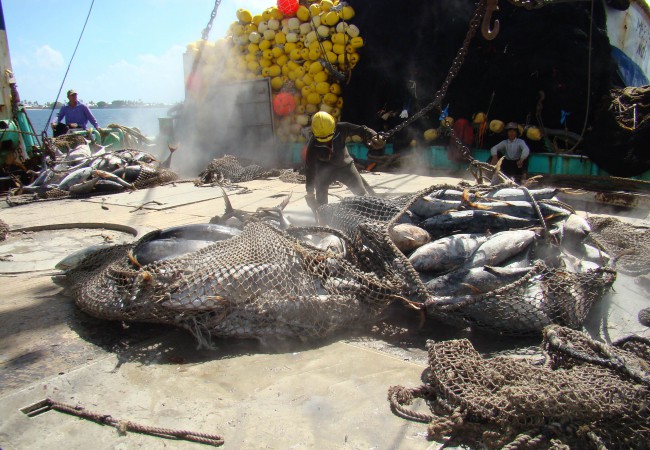
PNA’s model should be cloned by Pacific region
Since 2009, the Parties to the Nauru Agreement (PNA) has become a major force in the Pacific’s commercial fishing industry, long dominated by distant water fishing nations. The astounding increase in revenue accruing to the eight member nations since 2010 confirms an important fact: the billions of dollars that Pacific islands have been losing for the past many decades by being passive sellers of licenses and operating from positions of weakness as individual nations negotiating with Japan, the United States, China, Taiwan, S. Korea and, more recently, the European Union.
In 2010, skipjack tuna caught was valued at USD1.9 billion, with only USD60 million of that going to PNA nations through licensing arrangements. This year, PNA CEO Dr. Transform Aqorau projects that overall fisheries revenue will increase to nearly USD3.9 billion, with the PNA share rising to USD249 million. It’s still only six percent of the revenue generated by the lucrative skipjack industry, but indicates the growing clout that this bloc of countries that control waters supplying a majority of the world’s skipjack tuna are exerting. Similarly, late last year, the US government and its tuna industry agreed to pay USD63 million annually starting this year for access to the PNA area, up from USD21 million a year.
The PNA area encompasses the Marshall Islands, Kiribati, Tuvalu, Nauru, Federated States of Micronesia, Palau, Solomon Islands and Papua New Guinea.
PNA has not only more than tripled revenue from fisheries, it has driven conservation management initiatives ranging from annual moratoriums on use of fish aggregation devices (FADs) to banning fishing in high seas pockets adjacent to PNA nations’ 200-mile exclusive economic zones. The management control it is exerting is allowing it to develop business initiatives to bring greater domestic investment in fisheries and to create value-added products, such as sustainably caught tuna that are harvested without the use of FADs. The Marine Stewardship Council recently certified PNA’s skipjack fishery. Fish caught without FADs will carry the MSC certification symbol, which is expected to command higher value in the European and US markets where consumers will pay more for sustainably caught tuna.
Does the PNA model have application elsewhere in the region? Absolutely. But the problem is old style, bad governance exists at many levels of government throughout the region. So why should politicians who see government as their own private business, to be exploited for personal benefit, use the PNA model in other areas?
There is pressure from commercial interests outside the region to get access for marine resources, deep-sea mining, and land resources. It is really easy for island leaders — mayors, governors, members of parliament, high-ranking landowners — to fall prey to outside interests. Despite its membership in PNA, the Marshall Islands, for example, sees local governments willing to sign off on deals with Asian fishing companies through agreements that would not pass a ‘good governance’ test. The recent granting by the Vanuatu government of licenses to deep-sea mining interests prompted community opposition for its lack of transparency.
The fact is, there are plenty of outsiders looking to cash in by exploiting island resources for a fraction of what they’re worth — the Pacific tuna fishery is a prime example. Money aside, what is worse is that without conservation rules to govern the exploitation, at the local level, small island communities can wake up one morning to find their source of subsistence wiped out for a few thousand dollars that was handed to their leaders.
The challenges PNA has had to overcome in forcing conservation measures on the fleets of distant water fishing nations shows that without entities such as PNA, these outside industries would exploit the fishery until it is wiped out — following similar patterns globally that have seen the collapse of other commercial fisheries.
In the Pacific, we frequently see island leaders willing to engage in ad hoc, one-off deals with outside companies for quick money. Sadly, as the tuna fishery shows, without a focused, coordinated and informed approach to doing business with Asians, Europeans, Americans, Australians and others, most Pacific islanders get the short end of the stick. This could be explained away many years ago by lack of communication, which meant people in one island had no clue about what was happening in a neighboring country, nor access to examples of ‘best practice’ that could be applied.
But the Internet, regional organizations, and frequent meetings in the Pacific means there is no reason — other than blatant corruption — for leaders to keep doing the one-off, ad hoc deals that are to the detriment of local communities and sometimes their country as a whole. The PNA is not the only example of a functioning regional entity, but it is a leading example of how small islands can come together to generate significant benefits for their countries.
Still, demonstrating how hard it is to maintain this type of unity across borders, the PNA itself has its own share of flashpoints. Last year, Kiribati refused to abide by fishing day limits, prompting a reprimand from the other countries and a promise that it would not break ranks this year. The division of the approximately 50,000 fishing days among the eight PNA member nations causes disputes, though none that to date have risen to the point of breaking up the PNA. But there are countries ready and willing to ignore PNA rules if one of its members is willing to negotiate directly with it — another confirmation of the difficulty in getting good governance principles embedded in dealings with foreign commercial interests, even when the template is in use by the country in question.
No multi-national organization is conflict free, and PNA is no exception. It has shown, however, that the old axiom ‘unity is strength’ is a fact that is benefiting Pacific islands like never before.

